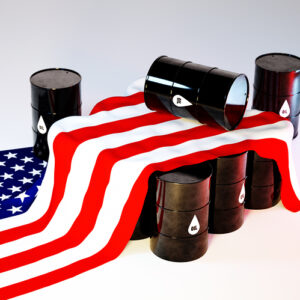For a different point of view see: “Point: Record Production Means Energy and Economic Security”
America is producing more oil and gas than any nation at any point in history, and it’s an accomplishment that fails to give U.S. families energy security or lower prices. At the same time, U.S. exports of oil and gas have surpassed every other country on earth, enriching oil and gas executives while leaving families in the cold.
At the end of last year, more than 13 million barrels of crude oil were pumped daily from American lands and offshore waters, a record. Domestic methane gas production also set a record of more than 105 billion cubic feet daily.
America’s fossil fuel boom has resulted in massive profits for Big Oil giants, as companies pay out huge sums to shareholders and export fossil fuels worldwide while leaving American households, businesses and low-income communities in the lurch.
In recent years, the United States has followed the Qatari economic development model, latching our economy to finite natural resources with highly volatile prices. This move spells disaster for the global climate.
The surge of oil and methane gas exports is not only lethal for the planet, it means that we put American consumers at risk of paying higher — and more volatile — prices. Two years ago, the outbreak of war in Ukraine made clear that the boom in U.S. fossil fuel production and exports did nothing to remove Americans from the wild swings of energy markets.
Historically, what has set the American economy apart is not our aptitude for exporting raw natural resources but the value provided by manufacturing and innovation — the very sectors threatened by the higher fuel prices that will result from exports.
Instead of a raw material-extraction economy, we should build a sustainable, decarbonized 21st-century clean energy economy, which requires swiftly phasing out the fuels of the 19th century.
The U.S. economy is more tightly interlinked with global energy markets, so U.S. consumers are even more vulnerable to international supply shocks and punishing price swings.
This volatility is partly a consequence of the oil and gas industry’s push to make more money by exporting fuel, including an industry lobbying blitz that led to a 2015 decision by Congress to end a ban on crude oil exports that dated back to the energy crisis of the mid-1970s.
At the time, television ads paid for by the American Petroleum Institute claimed that lifting the export ban would push down gasoline prices and diminish Russia’s and Iran’s influence over gasoline prices. These claims proved untrue.
Oil billionaire Harold Hamm, CEO of Continental Resources, was more forthright about the true goal: more profit. “We’re out here trying to compete at a discounted price,” Hamm told CNBC then. “I need to be able to deliver my oil to my partners in South Korea, but I can’t do it.”
But what’s good for the profits of Big Oil barons like Hamm is terrible for American families and businesses.
Fossil fuel industry talking points regarding exports of liquified methane, or LNG, are even more misleading. Exports of this fuel were nonexistent before 2016. But in just a few short years, the United States has become the world’s largest LNG exporter.
We should not make our residential and business gas customers compete with Berlin and Beijing for LNG produced in the United States. One energy model found that approving pending LNG terminals would increase spending on gas by $11 billion to $18 billion annually, with the most significant burden falling on low-income families. The trade group representing industrial businesses that are large consumers of gas and electricity is warning about the increased costs to its members.
Thankfully, the Biden administration is starting to take these issues seriously. President Biden’s wise decision last month to pause new approvals of LNG export terminals and establish a more robust public interest evaluation of those projects is a welcome sign.
Under federal law, the Department of Energy is required to evaluate whether LNG export projects are in the public interest. Yet, the agency has done a poor job of considering the negative effects on the climate, on vulnerable communities near LNG plants and on prices paid by consumers. The deck has been stacked in favor of export terminal developers.
Big Oil executives have pursued an “America Last” policy, price gouging consumers and pushing harmful export policies, a myopic vision that puts profit above everything. In the long run, we must wean ourselves from a dangerous dependence on fossil fuels that have sowed turmoil and chaos.
Reconsidering the effect fossil fuel exports have on our economy and climate is a vital step toward protecting American households and businesses from the impact that fuel exports have on our economy.

